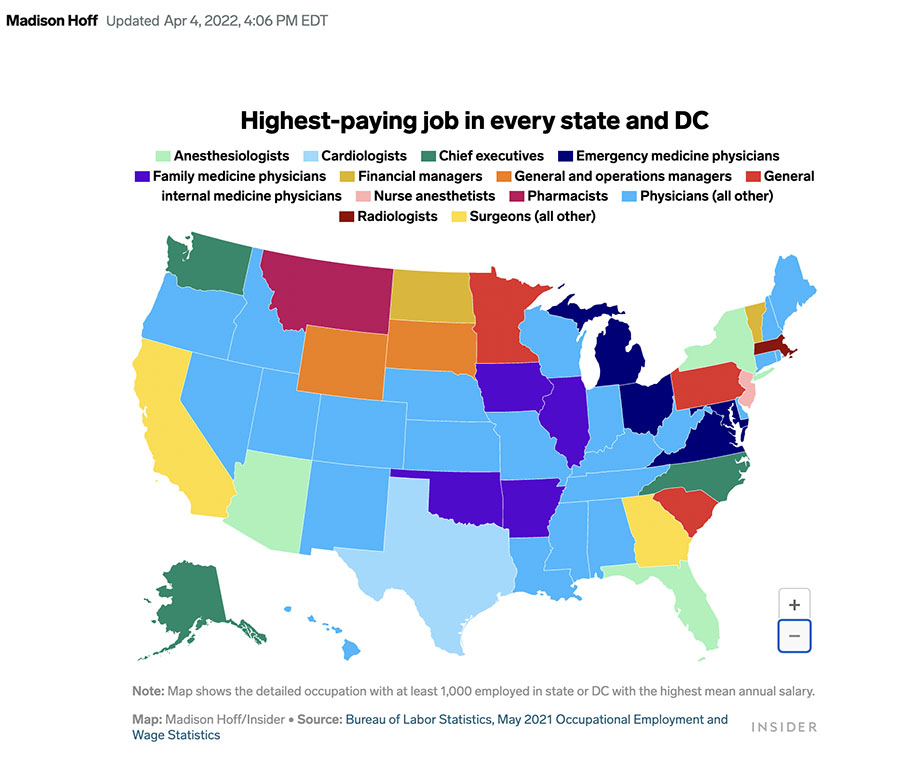Most hiring tools answer whether candidates can and will do the job, but not if they’ll stay. Learn how realistic job previews and motivational-fit interviews can improve retention from day one.
Is Your Turnover Priority for Your Highest-Paid or the Most Frequent?

It makes sense that companies focus on cutting turnover for their highest-turnover positions like nurses in healthcare, agents in call centers, and production workers in manufacturing. But a new study calls into question whether other, higher-paying jobs should be included as well. I’ll use healthcare as an example but reference other industries later to make this important point. Let’s start by studying the map below:

Is Highest-Pay Equal to Costliest Turnover?
Published by Business Insider, this map provides the highest-paying job in each state by sourcing data from our Bureau of Labor Statistics. Most notable is that while every job in our country is eligible to be named here, the total number of jobs named as top-paying in one or more states is just 13. And 11 of those 13 top-paying jobs are in healthcare. Who saw that coming?
Maybe it’s time we all bought our kids plastic stethoscopes. Who could blame us for trying?
The real lesson, though, is if we can safely presume high pay equals most essential…and I believe we can…then there are at least 11 jobs in healthcare that are more important to retain than nurses who traditionally have a higher rate of turnover. And my bet is the top onsite technology employee in each call center facility or manufacturing plant is also more important for you to retain than the call center agents or manufacturing production workers supported by your technology professionals.
Yet these highest-paid workers slip through the net and never receive a Stay Interview from their managers. The thinking is they are already well-connected to their boss so don’t need to experience a structured interview to disclose why they stay or might leave. Said another way, Stay Interviews are for entry-level or lower-paid people versus those at or near the top. That these upper-tier employees are exempt due to their age, pay, or levels of experience such that their also-top-level managers need not inquire directly about their likelihood to stay.
Turnover Also Equals Loss of Revenue
Let’s apply this theory to healthcare and take it one giant step further. Hospital executives work hard to recruit doctors so their hospitals collect revenues when those doctors refer patients for health services to their hospitals versus neighboring hospitals. Those revenues come from insurance, our government, or the patients themselves, resulting in more bottom-line dollars for the hospital. And it’s easy to assume that half or more of hospital revenue comes from affiliated doctor referrals.
Yet having said that, I’ve never seen a hospital organization chart that contained doctors on it, nor the person to whom they report. And when I’ve asked hospital-affiliated doctors who they report to, their usual answer is “no one”. So these doctors serve as super-charged salespeople for hospitals but usually with no one assigned to manage them or ensure their employee retention. And a fair assumption is losing one doctor costs at least four times the cost of losing one nurse. Looking back to our map, a full seven of the 13 noted highest-paying jobs in each state are doctors.
So I would ask a manufacturing company, who purchases your hardware and keeps it current? And who drives the technology, along with who backs up that person who drives the technology because we need to have someone 24/7 who can troubleshoot and repair it?
Call centers are as electronic-dependent as manufacturing or more. And each industry relies on sales and service leaders and their teams to ensure the full production cycle of those businesses is won. One might also make the case that the VP of sales is your company’s most valuable employee, each and every year.
Stay Interviews for Everyone to Cut Turnover
So who should have a Stay Interview? The easy answer is everyone. In today’s labor market, any job for which you’ve gained approval and hired someone to fill it is by nature valuable enough that you need to retain the high- or adequately-performing person in it. And Stay Interviews have proven to be the top turnover cutting solution on our planet.
Here’s a healthy employee retention exercise. Make a list of the 10 most important employee retention jobs in your company. Pay no mind to how frequently those jobs experience turnover or your current list of openings. Instead, consider every job, top to bottom, for which you can least afford to lose the incumbent in that job today. Then list the manager for each of those jobs and consider if that manager has ever conducted a Stay Interview for your most-need-to-retain incumbents…and also if those managers are currently being held accountable to keep the most important employees in your company.
The truth is, now, more than ever, every employee who is performing their job adequately must be retained. But, it’s important to account for higher-paid employees important to your organization’s success in your retention planning.
You Can Cut Turnover by 20% or More, No Matter Your Industry
There is an established solution for employee turnover…start here to learn our comprehensive turnover solution, and watch the 2-minute video to open your eyes to fresh thinking for cutting turnover 20% and more. Then schedule a conversation with me at DFinnegan@C-SuiteAnalytics.com.



